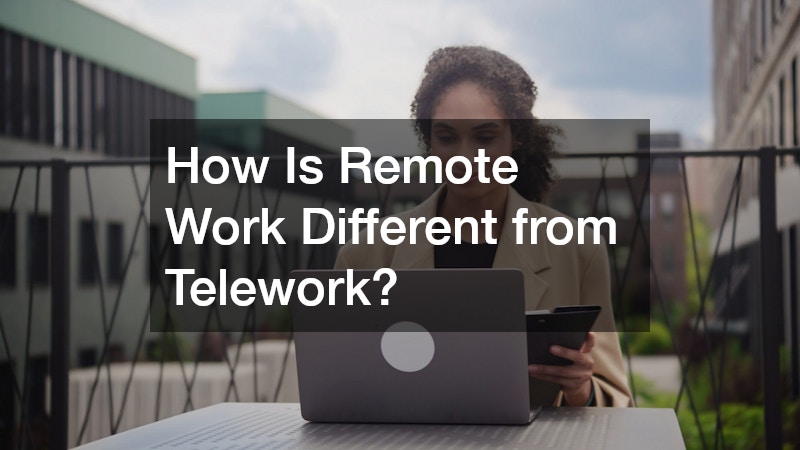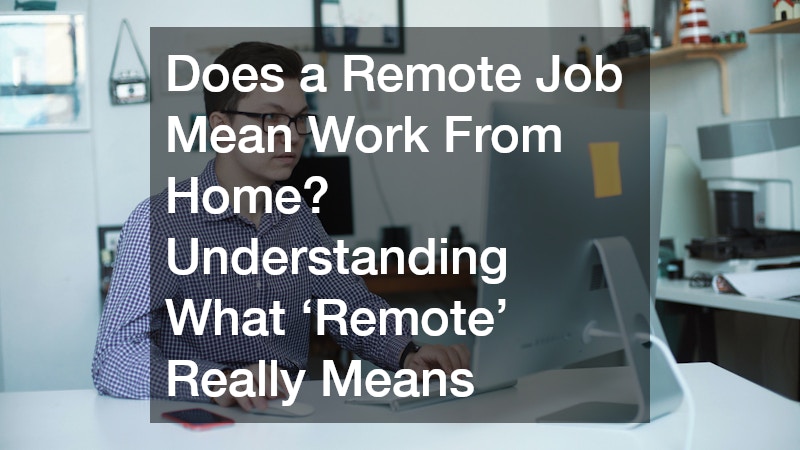Disclaimer: This website provides health information for educational purposes only and is not a substitute for professional medical advice, diagnosis, or treatment. Always seek the guidance of a qualified healthcare provider with any questions you may have.
The rise of flexible work has introduced a whole new set of terms to the workplace vocabulary—remote work, telework, hybrid, work-from-home, and more. But one of the most commonly asked questions by job seekers and curious professionals is: Does a remote job mean work from home? The short answer is: not always. While many remote jobs allow employees to work from home, some positions may require travel, visits to coworking spaces, or even proximity to a regional office. Understanding what “remote” really means is essential for setting realistic expectations and choosing the right opportunity.
In this article, we’ll break down the meaning of remote work, compare it with similar terms like telework, explore what remote roles involve, and help you assess if this flexible working style is right for you.
What Does a Remote Job Really Mean?
A “remote job” generally refers to a position that doesn’t require employees to report to a centralized office daily. However, it doesn’t always guarantee that you’ll be working from your couch in pajamas. The specifics of a remote role can vary significantly based on the company’s policy, industry, and location requirements.
There are different flavors of remote jobs:
- Fully remote: You can work from anywhere—home, coffee shops, or another country.
- Remote-first: The company is structured around remote work but may have optional office spaces.
- Partially remote: Some days are remote, but occasional office visits or meetings may be required.
- Remote with geographic restrictions: You must live in a certain state or country due to tax or legal considerations.
Understanding the employer’s expectations is key. Always ask clarifying questions before accepting a remote position.
How Is Remote Work Different from Telework?

When exploring job postings, you may see terms like “telework” and “remote work” used interchangeably, but there are subtle distinctions that matter. In the telework vs remote work discussion, context is everything.
Telework typically refers to working from a location other than the main office—usually from home or a satellite location—while still being tied to a specific geographic area. Government agencies and traditional companies often use “telework” to describe limited or conditional flexibility.
Remote work, on the other hand, leans more toward a location-independent model. Remote workers might never set foot in a company office and often collaborate with fully distributed teams across time zones.
In short:
- Telework = Limited, often location-tied flexibility.
- Remote work = Broad, sometimes global flexibility.
Does a Remote Job Mean Work From Home All the Time?
Not necessarily. Many people assume that remote jobs are synonymous with working from home, but this can be misleading. A remote job may allow for working at home some or even most of the time, but some roles might involve:
- Client visits or in-person meetings
- Team retreats or occasional office collaboration
- Regional coverage (especially for sales or field-based roles)
- Working from coworking spaces sponsored by the employer
Always review the job description carefully and look for indicators like:
- “Must be located in [region/city]”
- “Occasional travel required”
- “Hybrid remote/work-from-office schedule”
If your goal is to never commute again, make sure the role is advertised as “fully remote” and confirm the policy during your interviews.
Key Questions to Ask About Remote Job Flexibility
Before accepting a remote job offer, it’s smart to dig deeper into the company’s remote culture and policies. Here are key questions to ask:
- Is this a fully remote role, or are there any in-person expectations?
- Are there specific hours I need to be online, or is the schedule flexible?
- What tools and systems are used to support remote collaboration?
- Will I need to live in a specific state or country for tax or legal reasons?
- Is the company remote-first, hybrid, or transitioning from in-office?
These answers will help you gauge whether the company’s definition of remote matches your lifestyle and goals.
What Tools and Tech Are Needed to Work Remotely?

Success in remote roles depends heavily on your digital setup. Whether you’re working from home or a shared space, the right tools are essential. Most remote workers rely on:
- High-speed internet connection
- Laptop or desktop computer
- Headset with microphone
- Webcam for virtual meetings
- Collaboration tools like Zoom, Slack, Microsoft Teams, or Google Workspace
- Task management apps like Trello, Asana, or Monday.com
Some employers provide equipment stipends or full hardware setups. Clarify what’s included in your offer.
Can You Advance Your Career in a Remote Job?
Yes—but it takes intention. One common concern about remote work is whether it limits opportunities for growth and visibility. While it’s true that remote roles can lack the casual office networking moments, many companies are adapting.
To succeed and grow in a remote environment:
- Proactively communicate with managers and peers
- Participate in virtual team meetings and discussions
- Request feedback regularly
- Set clear career goals and share them with leadership
- Join online mentorships or peer groups
Remote jobs don’t have to mean career stagnation, as long as the organization has solid communication and development structures in place.
How Does Remote Work Affect Work-Life Balance?
One of the biggest selling points of remote work is improved work-life balance, but it’s not always guaranteed. In fact, remote workers often report working longer hours or struggling to “log off” at the end of the day.
Here are some strategies to stay balanced:
- Set a consistent schedule and stick to it
- Create a dedicated workspace separate from personal areas
- Use a time-tracking app to monitor your hours
- Take regular breaks and step outside
- Establish clear boundaries with household members
When done right, remote work can offer more time with family, flexibility in managing your day, and reduced stress from commuting. But it requires self-discipline and employer support.
Conclusion: Clarifying the Meaning of “Remote Job”
So, does a remote job mean work from home? Sometimes—but not always. The key takeaway is that “remote” doesn’t equal “unlimited freedom” by default. It’s a broad term that can include fully at-home roles, field positions, hybrid arrangements, or geographically limited setups.
By asking the right questions, understanding related terms like telework vs remote work, and aligning your tech setup and goals, you can take full advantage of the flexibility remote work offers. Whether you’re considering a career shift or just curious about the options, knowing what remote really means puts you in a stronger position to choose the right fit for your life.

